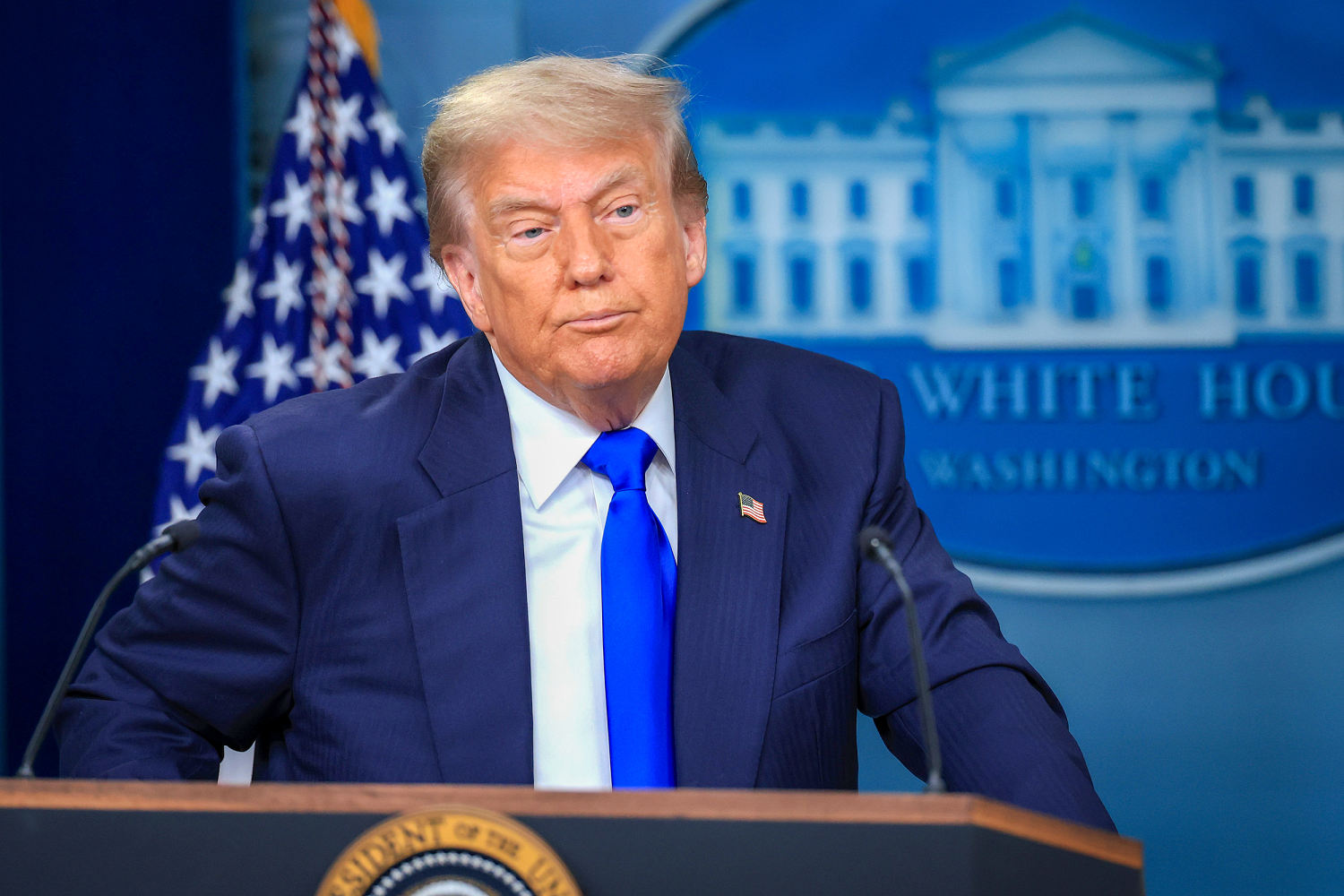
Democratic legislators mostly in blue states are attempting to fight back against President Donald Trump’s efforts to withhold funding from their states with bills that aim to give the federal government a taste of its own medicine.
The novel and untested approach — so far introduced in Connecticut, Maryland, New York and Wisconsin — would essentially allow states to withhold federal payments if lawmakers determine the federal government is delinquent in funding owed to them. Democrats in Washington state said they are in the process of drafting a similar measure.
These bills still have a long way to go before becoming law, and legal experts said they would face obstacles. But they mark the latest efforts by Democrats at the state level to counter what they say is a massive overreach by the Trump administration to cease providing federal funding for an array of programs that have helped states pay for health care, food assistance and environmental protections.
“Trump is illegally withholding funds that have been previously approved,” said David Moon, the Democratic majority leader in Maryland’s House of Delegates. “Without these funds, we are going to see Maryland residents severely harmed — we needed more options on the table for how Maryland could respond and protect its residents.”
Moon said the two bills are in response to various Trump actions that have withheld federal funding for programs that pay to assist with children’s mental health and flood wall protections. He compared the bills he’s introduced to traditional “collections” actions that one would take against a “deadbeat debtor.” Even if they were not to move forward, Moon said the bills would help to bring about an audit and accounting of federal money to the state.
Early in his second term, Trump’s Department of Government Efficiency unilaterally froze billions of dollars in funding for programs that states rely on. He’s also threatened to withhold federal funding from states that implement policies he politically disagrees with, including “sanctuary” policies for undocumented immigrants, though some such freezes have been halted by courts.
A Trump White House spokesperson didn’t respond to questions for this story.
Wisconsin state Rep. Renuka Mayadev, a Democrat, introduced two near-identical bills that she said would seek to compel the federal government to release money it has withheld that had previously been paying for Department of Agriculture programs that help farmers, and for child care centers that mostly serve low-income families.
“We’ve seen the Trump administration is willfully breaking the law by holding back federal funds to which Wisconsinites are legally entitled. So these bills are really about providing for a legal remedy and protecting Wisconsinites,” she said.
In all four states, the bills direct state officials to withhold payments owed by the states to the federal government if federal agencies have acted in contravention of judicial orders or have taken unlawful actions to withhold funds previously appropriated by Congress. Payments available for withholding include the federal taxes collected from the paychecks of state employees, as well as grant payments owed back to the federal government.
In Wisconsin, the bills are unlikely to move forward because Republicans control both chambers of the Legislature. But the trajectory of the bills in Maryland, New York and Connecticut — where Democrats control the legislatures and governorships — is an open question.
The same is true in Washington, where Democratic lawmakers plan to introduce similar bills next session.
“It’s a novel concept,” said Washington state Sen. Manka Dhingra. “I don’t think states have ever been in this position before … where there’s someone making arbitrary decisions on what to provide funding for and what not to provide funding for, contrary to current rules and laws and congressional allocation of funds.”
Legal experts have raised substantial questions about the hurdles such bills would face if they were enacted.
For one, they said, the U.S. Constitution’s supremacy clause clearly gives the federal government precedence over states, which could complicate legal arguments defending such laws — even though it remains an open legal question whether the executive branch has the power to single-handedly control funding.
More immediate practical obstacles, they explained, stem from the fact that there’s vastly more money flowing from the federal government to the states than the other way around.
“So withholding state payments to the federal government, even if there were no other obstacles, isn’t likely to change very much,” said David Super, a professor at the Georgetown University Law Center who specializes in administrative and constitutional law.
Super added that states withholding money could potentially further worsen the status of programs affected by federal cuts.
“There’s also the potential that some of the money going to the federal government has to be paid as a condition for the state receiving one or another kind of benefit for itself or for its people,” he said. “The federal government could say, ‘You didn’t make this payment, therefore you’re out of this program completely.’”
But that doesn’t mean states, working in the current hostile political environment, shouldn’t try, said Jon Michaels, a professor at the UCLA School of Law who specializes in the separation of powers and presidential power.
“Where can you try to claw back money in different ways? Not because it’s going to make a huge material difference for the state treasury or for the people of the state, but just to essentially show the federal government like, ‘Hey, we know what you’re doing and we don’t like it,’” he said. “States need to be enterprising and creative and somewhat feisty in figuring out their own scope of authority and the ways in which they can challenge the law.”
But another potential drawback is one foreseen by the Democratic lawmakers themselves: further retribution from Trump.
“We would all be foolish to not acknowledge that the feds hold more cards than states do with respect to the budget,” said Moon, the Maryland legislator. “There’s certainly a risk of retaliation by the White House.”

Leave a Reply